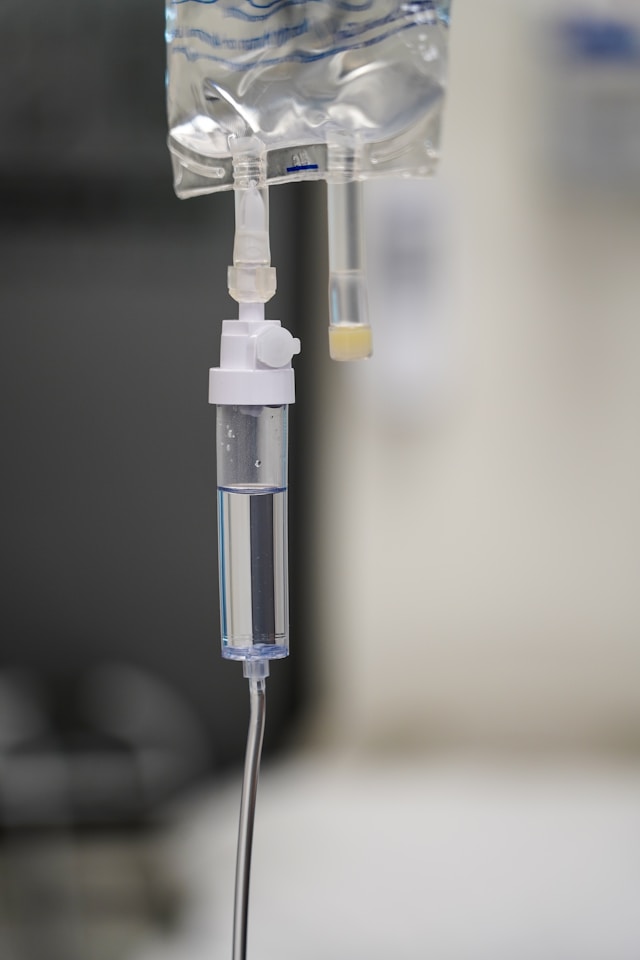
Infusion Therapy for Rheumatoid Arthritis


Dr. Chen is a board-certified immunologist with over 15 years of experience treating autoimmune and immunodeficiency disorders. She specializes in IVIG therapy and has published extensively on immune system treatments.
Medical Disclaimer
Rheumatoid arthritis (RA) is a chronic autoimmune disease that causes painful inflammation in your joints, and if left untreated, can lead to permanent joint damage and disability. While oral medications help many people manage RA symptoms, infusion therapy has become a cornerstone treatment for patients who need stronger disease control. Biologic infusions can dramatically reduce inflammation, slow disease progression, and help people with RA return to more active, comfortable lives. Understanding how infusion therapy works for rheumatoid arthritis helps you make informed decisions about your treatment options.
Key Highlights
- Biologic infusion therapies for RA target specific immune system proteins that drive inflammation, often providing better disease control than traditional oral medications alone.
- Common infusion medications for RA include Remicade, Orencia, Actemra, and Rituxan, typically given every 2-8 weeks depending on the specific drug.
- Many RA patients notice significant improvement in pain, stiffness, and joint function within weeks to months of starting infusion therapy, with some achieving remission or low disease activity.
Understanding Rheumatoid Arthritis
Rheumatoid arthritis occurs when your immune system mistakenly attacks the lining of your joints (called the synovium), causing inflammation, pain, swelling, and eventually joint damage. Unlike osteoarthritis which results from wear-and-tear, RA is an autoimmune condition where your body's defense system malfunctions.
RA typically affects joints symmetrically—if your right wrist is inflamed, your left wrist likely is too. Common affected areas include hands, wrists, feet, knees, and ankles, though RA can impact any joint. Beyond joints, RA can cause fatigue, fever, and affect other body systems including your eyes, lungs, heart, and blood vessels.
According to the Arthritis Foundation, approximately 1.5 million Americans have rheumatoid arthritis, with women three times more likely to develop the condition than men. While RA typically begins between ages 30-60, it can occur at any age.
Left untreated or inadequately controlled, RA causes progressive joint damage that can lead to deformity, loss of function, and disability. This is why aggressive treatment to control inflammation and prevent damage is so important.
Why Infusion Therapy for Rheumatoid Arthritis
Infusion therapy becomes recommended for RA in several situations:
Inadequate Response to Oral DMARDs: Many RA patients start treatment with oral disease-modifying antirheumatic drugs (DMARDs) like methotrexate, hydroxychloroquine, or sulfasalazine. When these medications don't provide sufficient symptom relief or disease control, biologic infusions offer a more targeted approach.
Moderate to Severe Disease: Patients with highly active RA, multiple swollen and tender joints, elevated inflammatory markers, or rapid disease progression often benefit from the stronger immunosuppression that biologic infusions provide.
Preventing Joint Damage: Early aggressive treatment with biologics can prevent irreversible joint destruction. The American College of Rheumatology recommends biologic therapy for RA patients who continue to have active disease despite conventional DMARD treatment.
Combination Therapy Benefits: Many patients use infusion biologics in combination with oral methotrexate, which can enhance the effectiveness of the infusion medication and reduce the likelihood of developing antibodies against it.
Patient Preference: Some patients prefer receiving medication every few weeks under medical supervision rather than remembering daily oral medications, especially when biologics offer superior disease control.
Common Infusion Medications for Rheumatoid Arthritis
Several biologic infusions are FDA-approved for treating RA, each working through slightly different mechanisms:
Remicade (Infliximab): A TNF (tumor necrosis factor) inhibitor that blocks a key inflammatory protein. Remicade is typically given every 8 weeks after a loading dose schedule. It's one of the most established biologic treatments for RA with extensive long-term safety data. Infusions usually take 2-3 hours initially, potentially shortened to 1-2 hours with established tolerance.
Orencia (Abatacept): Works by blocking T-cell activation, preventing immune cells from triggering the inflammation that damages joints. Given every 4 weeks, with infusions taking about 30-60 minutes. Many patients appreciate the relatively short infusion time.
Actemra (Tocilizumab): An IL-6 receptor inhibitor that blocks interleukin-6, another inflammatory protein involved in RA inflammation. Given every 4 weeks, with infusions taking approximately 1 hour. Actemra is particularly useful for patients who haven't responded to TNF inhibitors.
Rituxan (Rituximab): Targets CD20-positive B cells (a type of immune cell) that contribute to RA inflammation. Rituxan has a unique dosing schedule—two infusions given 2 weeks apart, then repeated every 6 months or when disease activity returns. First infusions take 4-6 hours due to slower administration and careful monitoring.
Simponi Aria (Golimumab IV): Another TNF inhibitor given every 4 or 8 weeks (after loading doses). Infusions are relatively quick at about 30 minutes, making it a convenient option for patients needing TNF blockade.
According to the Mayo Clinic, biologic therapies have transformed RA treatment, allowing many patients to achieve low disease activity or even remission.
What to Expect from Infusion Therapy
Starting Treatment: Your rheumatologist will order baseline lab work before beginning infusion therapy, including blood counts, liver function tests, and screening for infections like tuberculosis and hepatitis. These tests ensure it's safe for you to start immunosuppressive treatment.
Loading Doses: Some medications require more frequent initial doses to build up therapeutic levels quickly. For example, Remicade is typically given at weeks 0, 2, and 6, then every 8 weeks thereafter.
Timeline for Improvement: Most RA patients begin noticing improvement within 2-6 weeks of starting infusion therapy, though maximum benefit may take 3-6 months. Some patients experience dramatic relief quickly, while others improve gradually. Joint pain and stiffness typically decrease first, followed by reduction in swelling.
Combination with Other Medications: You'll likely continue taking methotrexate or other oral DMARDs along with your infusion biologic. This combination approach often works better than either medication alone. You may also take NSAIDs or low-dose prednisone for symptom relief.
Ongoing Monitoring: Your rheumatologist will monitor disease activity through physical exams, patient-reported symptoms, and blood tests measuring inflammation (ESR, CRP). Regular monitoring helps determine if your treatment is working or needs adjustment.
Benefits of Infusion Therapy for RA
Patients who respond well to biologic infusions often experience:
Reduced Pain and Stiffness: Significant decrease in joint pain and morning stiffness, allowing easier movement and daily activities.
Decreased Joint Swelling: Visible reduction in swollen, tender joints and improved joint function.
Prevention of Joint Damage: Slowing or stopping the progressive joint destruction that leads to deformity and disability. X-rays and imaging may show stabilization of joint erosions.
Improved Physical Function: Better ability to perform daily tasks like dressing, cooking, working, and participating in hobbies or exercise.
Reduced Fatigue: Many patients report significant improvement in the overwhelming fatigue that often accompanies active RA.
Lower Disease Activity Scores: Objective measurements used by rheumatologists show improvement, with some patients achieving remission (minimal or no disease activity).
Better Quality of Life: Overall improvement in wellbeing, mood, sleep, and ability to engage in life activities.
The National Institute of Arthritis and Musculoskeletal and Skin Diseases reports that biologic therapies can significantly slow RA progression and improve long-term outcomes when started early in the disease course.
Potential Side Effects and Risks
Like all powerful medications, RA infusion biologics carry potential risks:
Increased Infection Risk: Because biologics suppress parts of your immune system, you're more susceptible to infections. Common infections like colds, sinus infections, or urinary tract infections may occur more frequently. Serious infections requiring hospitalization occur in a small percentage of patients.
Infusion Reactions: Mild reactions like itching, flushing, or headache can occur during or shortly after infusion. These are usually manageable with pre-medications and slower infusion rates. Serious allergic reactions are rare but possible.
Tuberculosis Reactivation: Latent TB can reactivate when taking biologics. This is why TB screening is required before starting treatment. If you test positive for latent TB, you'll receive preventive antibiotics before beginning your biologic.
Liver Enzyme Elevations: Some patients experience elevated liver enzymes, requiring monitoring through regular blood tests.
Injection Site or Infusion Reactions: Redness, swelling, or discomfort at the IV site can occur but is usually minor.
Long-Term Considerations: Some studies suggest a small increased risk of certain cancers with long-term biologic use, though the data is complex and risk appears low. Your rheumatologist will discuss these considerations.
Your healthcare team monitors you carefully for these potential issues through regular appointments, lab work, and symptom assessment.
Living with RA on Infusion Therapy
Infection Prevention: Practice good hand hygiene, avoid sick people when possible, stay current on recommended vaccinations (though some live vaccines are contraindicated), and report any fever or concerning symptoms to your doctor promptly.
Regular Monitoring: Attend all scheduled rheumatology appointments and complete recommended lab work. Early detection of issues allows for quick intervention.
Medication Adherence: Maintain your infusion schedule consistently. Missing or delaying infusions can lead to disease flare-ups and may increase the risk of developing antibodies against the medication.
Healthy Lifestyle: Continue joint-friendly exercise, maintain a healthy weight, eat an anti-inflammatory diet, manage stress, and get adequate sleep. These lifestyle factors complement your medical treatment.
Communication with Your Team: Report new symptoms, concerns about side effects, or changes in your condition. Don't wait for scheduled appointments if something worries you.
Cost and Insurance Considerations
Biologic infusions for RA are expensive medications, often costing thousands of dollars per dose. However, most patients pay far less than the full cost:
Insurance Coverage: Most insurance plans cover FDA-approved biologics for RA, though prior authorization is typically required. Your rheumatologist's office will submit documentation showing medical necessity.
Copay Assistance Programs: All major biologic manufacturers offer copay cards or patient assistance programs that can reduce your out-of-pocket costs to $0-50 per infusion, even with high coinsurance.
Foundation Support: Organizations like the Arthritis Foundation and various independent patient assistance foundations offer grants to help with medication costs for eligible patients.
Financial Counseling: Infusion centers typically have financial counselors who help you navigate insurance, apply for assistance programs, and explore all options to make treatment affordable.
Frequently Asked Questions
How quickly does infusion therapy work for rheumatoid arthritis?
Most RA patients begin noticing improvement within 2-6 weeks of starting biologic infusion therapy, with maximum benefit typically achieved by 3-6 months. Some patients experience dramatic relief within the first few weeks, while others improve more gradually. The timeline varies based on disease severity, which medication you're using, and individual response. Joint pain and morning stiffness usually improve first, followed by reduction in swelling and better physical function.
Can infusion therapy cure rheumatoid arthritis?
Infusion therapy cannot cure RA, which is a chronic autoimmune condition, but it can dramatically control disease activity and in some cases achieve remission (minimal or no active inflammation). Many patients on effective biologic therapy maintain normal or near-normal function and quality of life. However, stopping medication typically leads to disease flare-ups, so ongoing treatment is usually necessary to maintain disease control.
How often do you need infusions for rheumatoid arthritis?
Infusion frequency depends on the specific medication. Remicade is typically given every 8 weeks, Orencia and Actemra every 4 weeks, Simponi Aria every 4-8 weeks, and Rituxan every 6 months (two infusions given 2 weeks apart). Your rheumatologist will determine the appropriate schedule based on your medication and disease activity. Consistency with your infusion schedule is important for maintaining disease control.
What happens if infusion therapy stops working for my RA?
If your current biologic becomes less effective over time (called secondary treatment failure), your rheumatologist has several options: switching to a different biologic with a different mechanism of action, adding or adjusting your oral DMARD therapy, or trying combination approaches. Many biologics are available for RA, so if one stops working well, alternatives exist. Regular monitoring helps detect diminishing response early so adjustments can be made promptly.
Can I take other medications with my RA infusion therapy?
Yes, most RA patients take multiple medications together. Biologics are commonly combined with methotrexate or other oral DMARDs, which can enhance effectiveness. You can also take NSAIDs for pain relief, low-dose prednisone if needed, and medications for other health conditions. However, always inform your rheumatologist about all medications and supplements you're taking. Some combinations require dose adjustments or additional monitoring, and certain medications (like other biologics) shouldn't be combined.
Moving Forward with Treatment
If you've been prescribed infusion therapy for rheumatoid arthritis, it represents an opportunity for better disease control and improved quality of life. While the idea of regular infusions might feel overwhelming initially, most RA patients find that the significant symptom relief and slowed disease progression make treatment well worth the time commitment.
Modern biologic therapies have transformed RA from a potentially crippling disease to a manageable chronic condition for many patients. With proper treatment and monitoring, you can maintain joint function, stay active, and enjoy a good quality of life.
Ready to explore infusion options for your rheumatoid arthritis treatment? Find experienced infusion centers near you that specialize in RA care and can support your journey to better disease control.
Medical Disclaimer: This content is for educational purposes only and is not a substitute for professional medical advice, diagnosis, or treatment. Always consult your healthcare provider with questions about your medical condition or treatment options.
Article Statistics


Table of Contents
Article Statistics










